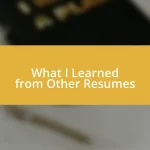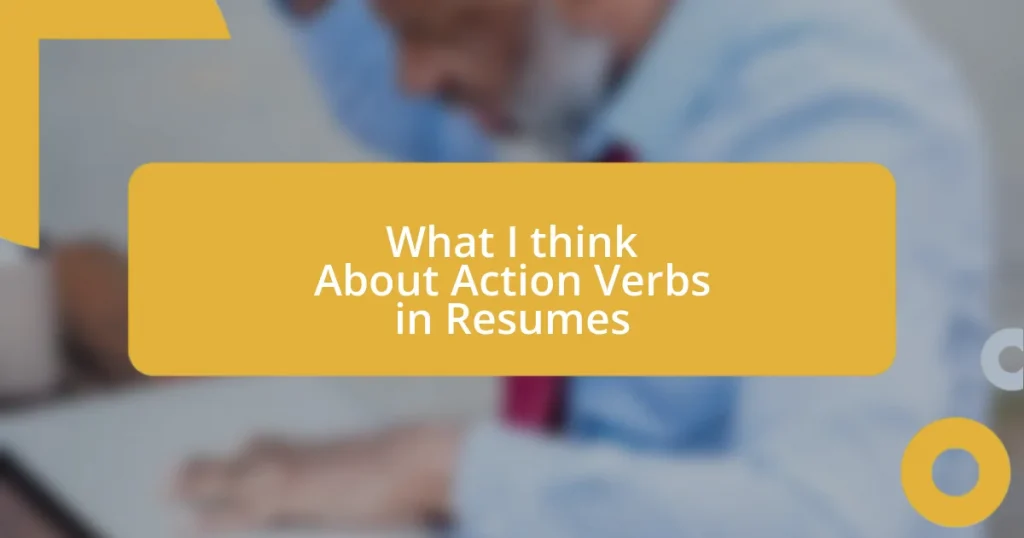Key takeaways:
- Action verbs enhance resumes by transforming descriptions of responsibilities into impactful narratives, showcasing initiative and achievements.
- Selecting the right type of action verbs—like leadership, creativity, communication, analysis, and support—clarifies your strengths and contributions.
- Common mistakes include overuse of the same verbs and misalignment with accomplishments; diverse and emotionally resonant verbs create a more compelling resume.
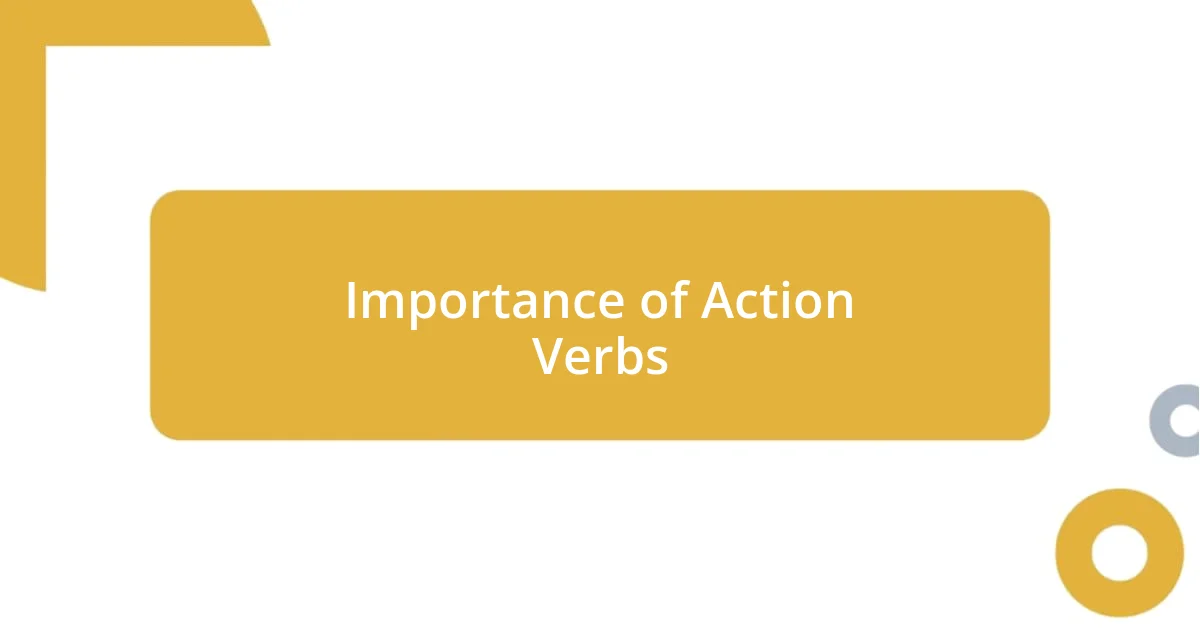
Importance of Action Verbs
Action verbs aren’t just fancy words; they are the heartbeat of a resume. I remember the time I revamped my own resume and replaced passive phrases with dynamic action verbs. The difference was striking. Suddenly, my experiences felt alive—words like “led,” “implemented,” and “designed” turned my contributions into accomplishments that spoke volumes.
Using strong action verbs can make your achievements stand out and resonate more with potential employers. Think about it: when hiring managers read a resume, they’re looking for candidates who take initiative. It’s not just about what you did; it’s about how you did it. When I helped a friend with her job application, using action verbs transformed her approach from merely stating responsibilities to showcasing her impact. Wouldn’t you want your efforts to shine in the best possible light?
Moreover, employing action verbs can influence how you view your own experiences. Personally, shifting my mindset to think about all the ways I contributed has not only helped me in job applications but also boosted my confidence. Every time I use an action verb, I feel a sense of pride—it’s an affirmation of my skills and determination. So, what story do your action verbs tell about your career journey?
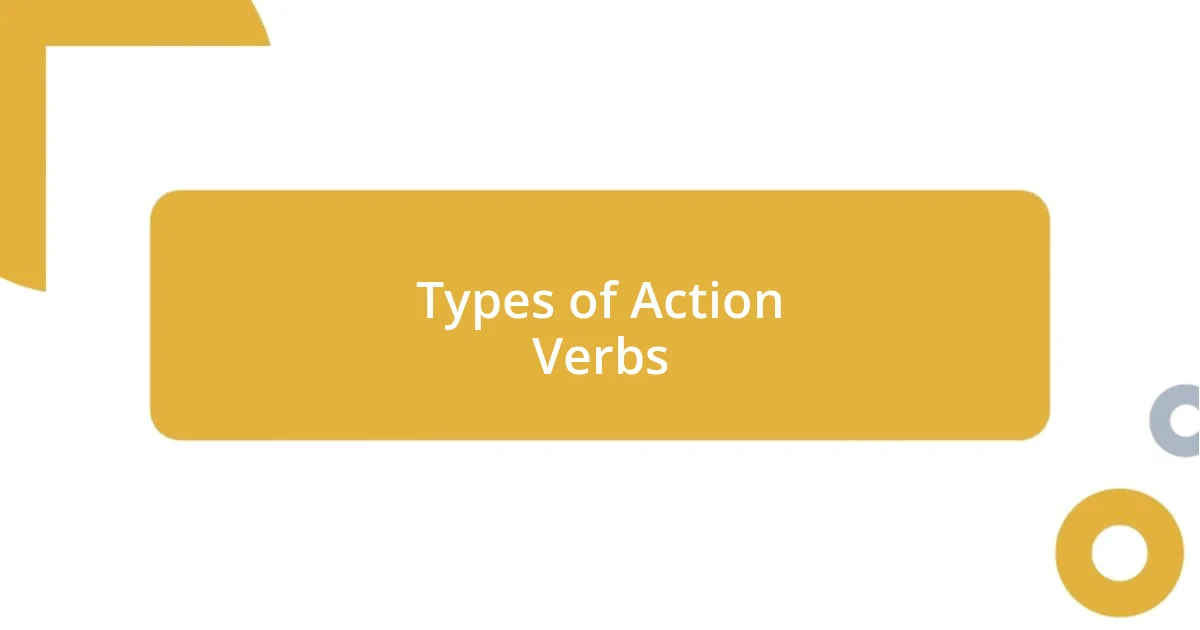
Types of Action Verbs
When it comes to action verbs, they can be categorized into several types, each serving a unique purpose. I’ve always found that understanding these distinctions makes a significant difference. For instance, I remember carefully selecting specific verbs when I was crafting a resume for a management position. Choosing the right type of action verb helped me highlight my leadership skills effectively. Here are some common categories of action verbs:
- Leadership: led, directed, managed, supervised
- Creativity: designed, developed, innovated, created
- Communication: presented, communicated, articulated, conveyed
- Analysis: analyzed, assessed, evaluated, researched
- Support: assisted, collaborated, facilitated, provided
In my experience, the impact of these verbs is profound. They not only convey what you did but also paint a picture of how you approached tasks. For example, while writing my friend’s resume, I noticed how choosing “streamlined” instead of simply “managed” transformed the way her efforts were perceived. Such subtleties can greatly influence the overall narrative of your professional journey, giving your experience a richer context. Each verb can shape the story you tell, emphasizing attributes that resonate well with potential employers.
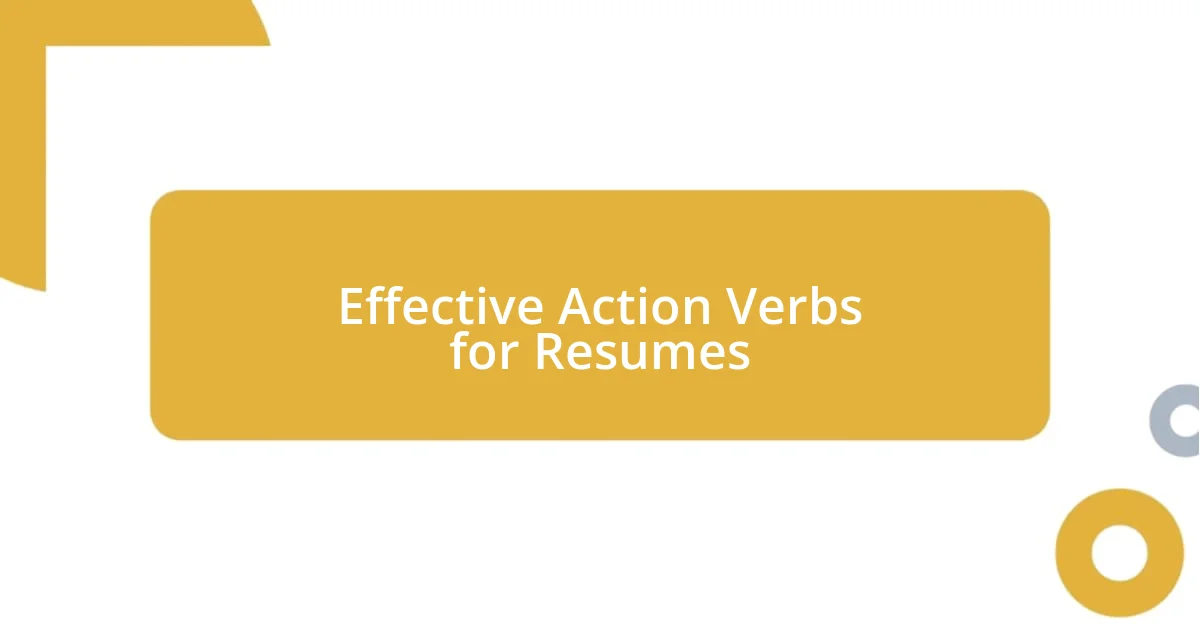
Effective Action Verbs for Resumes
Using effective action verbs in your resume can truly elevate your presentation to prospective employers. I’ve often found that verbs like “orchestrated,” “pioneered,” or “spearheaded” not only showcase initiative but also reflect my enthusiasm for the projects. Once, while tailoring my resume for a tech startup, opting for “implemented” instead of “used” drew attention to my proactive role in adopting new technologies. It made a compelling case for my ability to embrace change.
What I love about action verbs is their ability to convey energy and drive. For example, during a career transition, I focused on how I “transformed” an underperforming team into a high-achieving unit. This shift in terminology helped me communicate not just what I did but how I contributed to the overall success of the organization. It’s incredible how a single word can encapsulate such depth of experience and ambition.
When creating your own resume, consider the subtleties in the action verbs you choose. Reflecting on my own job search, I realized that verbs like “mentored” or “coached” allowed me to highlight my commitment to others’ success—an aspect I’m passionate about. Readers can sense the authenticity in these words, which resonate deeply. So why not make those verbs work for you?
| Category | Examples |
|---|---|
| Leadership | led, directed, managed |
| Creativity | designed, innovated, developed |
| Communication | articulated, presented, conveyed |
| Analysis | assessed, evaluated, researched |
| Support | collaborated, facilitated, assisted |
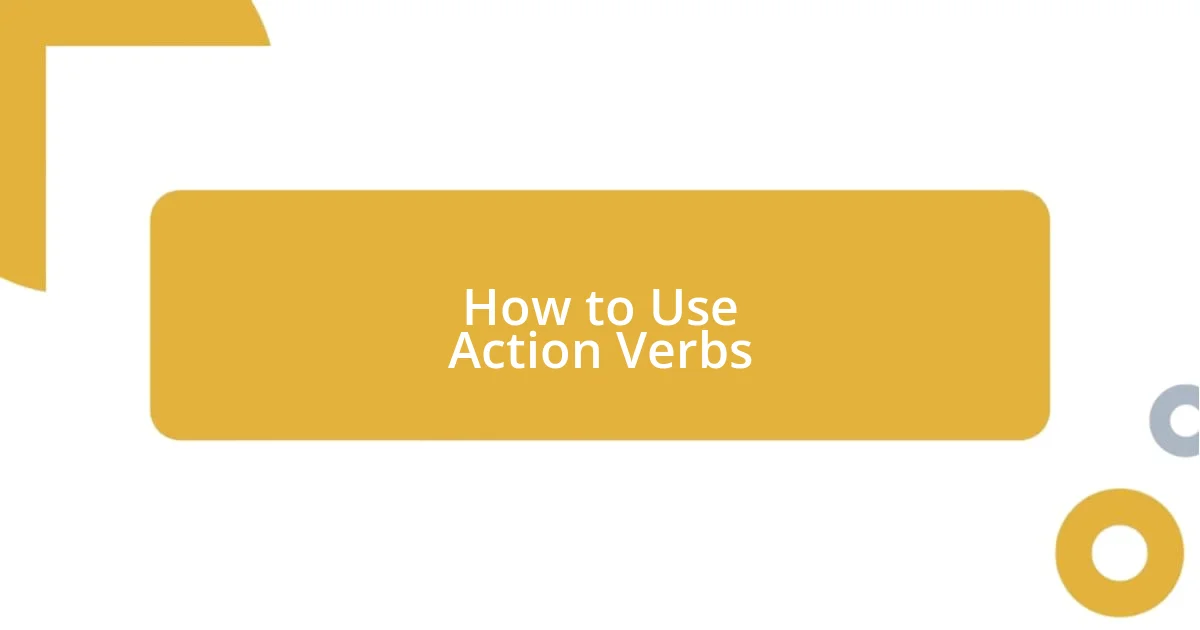
How to Use Action Verbs
To effectively use action verbs in your resume, start by aligning them with your specific experiences. For instance, when I was revamping mine, I made a point to visualize each responsibility I held. It was fascinating to switch from generic terms like “responsible for” to vibrant verbs such as “championed.” That subtle change redefined how I presented my contributions, emphasizing not just my duties but my impact.
Another essential tip is to tailor your action verbs to the job description you’re targeting. I remember one application required skills in team dynamics, so I opted for verbs like “facilitated” and “coordinated.” This choice illustrated my role in fostering collaboration within teams. Using contextually relevant action verbs helps you speak the language of your prospective employer, making your application more compelling.
It’s also important to think about the emotions you want to convey through your resume. When I highlighted times I “inspired” my colleagues, it added a personal touch that numbers alone couldn’t provide. Action verbs can tell a story about who you are as a professional. Have you ever paused to consider how the words you choose could resonate with someone reading your resume? It’s worth the reflection!
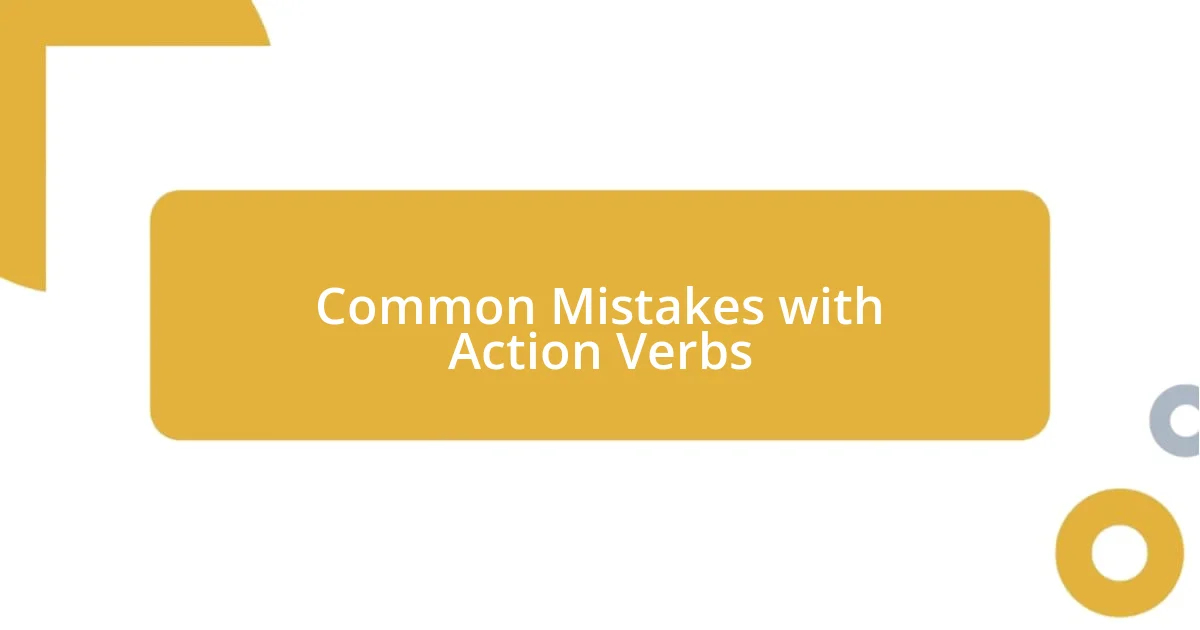
Common Mistakes with Action Verbs
One common mistake I see people make is overusing the same action verbs throughout their resumes. For instance, I once reviewed a friend’s resume where “managed” showed up at least five times. It became monotonous and failed to highlight the diverse skills she brought to the table. Instead, varying action verbs like “oversaw,” “coordinated,” and “executed” could have painted a more dynamic picture of her capabilities.
Another pitfall is misaligning action verbs with accomplishments. There was a point in my career when I chose the verb “assisted” to describe my involvement in a major project. While it was factual, it didn’t capture my leadership role in driving results. I learned that it’s crucial to select verbs that truly reflect the depth of your contributions; it can transform the narrative from passive to assertive. Isn’t it essential to project confidence when sharing your achievements?
Lastly, many folks miss the emotional resonance of action verbs. I remember how using the term “empowered” to describe my leadership style opened up discussions about my approach to team dynamics. It didn’t just say what I did; it conveyed my philosophy of fostering growth in others. How could a single word summarize your experience in a way that invites connection? It’s intriguing to consider how precise language can create a more impactful dialogue on paper.
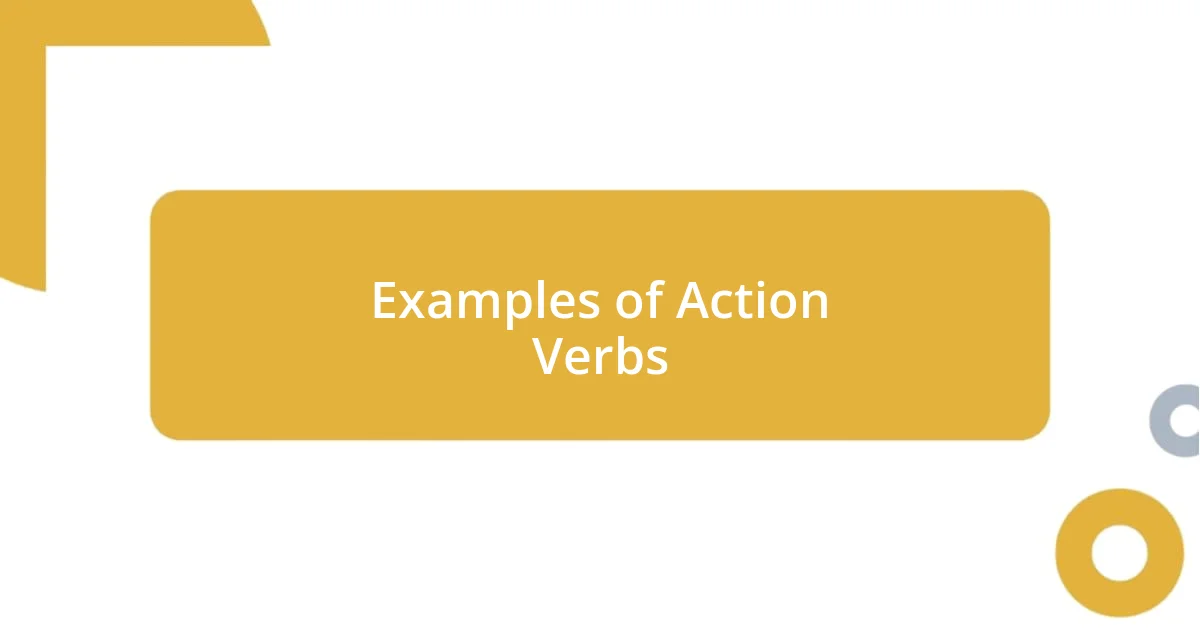
Examples of Action Verbs
When writing my resume, I found that using powerful verbs can dramatically shift perception. I used “orchestrated” to describe a project I led, capturing not just my involvement but the complexity and creativity of my efforts. This small yet significant change transformed my contributions into a vivid story—a snapshot of my leadership in action. Have you thought about how a single word can reshape your narrative?
In my experience, certain action verbs carry a weight that resonates more than others. For example, using “cultivated” instead of “developed” in reference to a mentorship program reflected my commitment to personal growth, both for myself and those I guided. It’s interesting how word choice can infuse your resume with emotion, sparking interest in readers. Have you found words that truly encapsulate your personal mission in professional settings?
I’ve also noticed that verbs like “innovated” can evoke curiosity. When I described a solution I designed with that verb, it invited further conversation in interviews. Instead of merely stating my role, I showcased a mindset of creativity and problem-solving. Isn’t it fascinating how the right action verb can invite potential employers to see you not just as a candidate, but as a visionary?
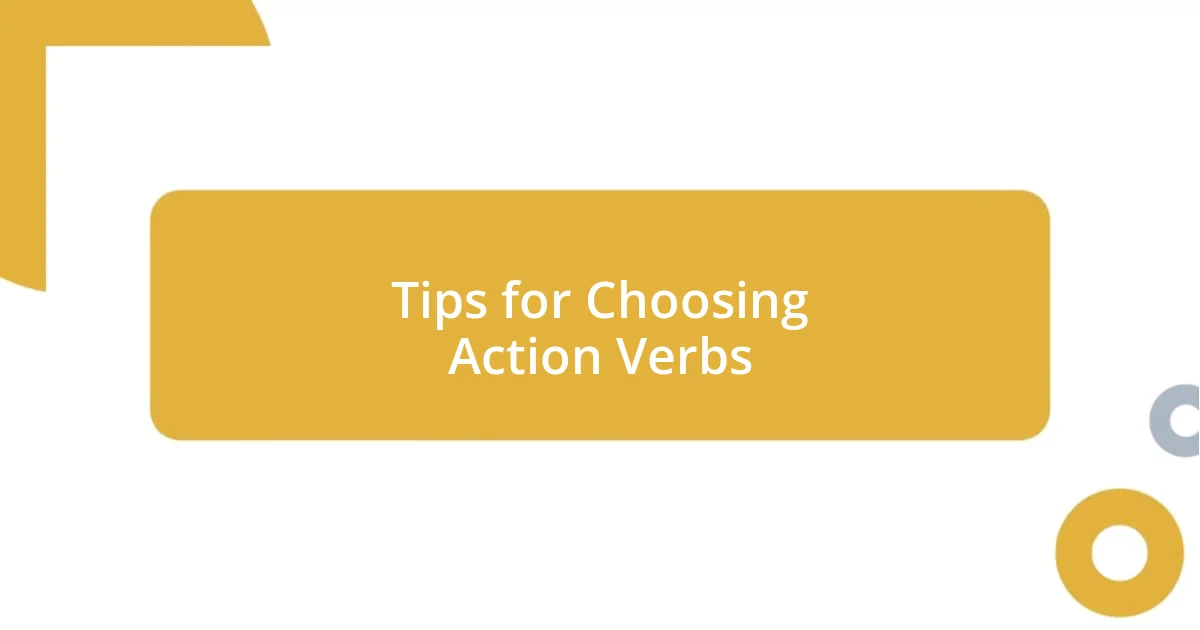
Tips for Choosing Action Verbs
Choosing the right action verbs is pivotal in creating a compelling resume. From my experience, it’s essential to consider your audience and the specific job you’re applying for. When I tailored my resume for a creative role, I opted for dynamic verbs like “crafted” and “designed” rather than more generic terms. This choice not only aligned with the job description but also connected me with hiring managers who valued artistic expression. Have you thought about how tailoring your language can reflect your fit for a role?
I’ve found that sparking interest starts with verbs that reveal your unique contributions. For instance, instead of saying “conducted meetings,” I once chose to say “facilitated impactful discussions,” which highlighted my ability to engage teams and foster collaboration. This small change made a significant difference in how my leadership skills were perceived. I encourage you to think about how your verbs can reflect the nuances of your experience—what story are you telling with each word?
Finally, consider the emotional impact of your chosen verbs. I remember using “championed” in place of “supported” when describing a volunteer project I led. The shift not only conveyed my proactive approach but also ignited passion in my audience. Words have power; they can evoke feelings and inspire connection. Have you explored how the verbs you choose can resonate deeply with your audience and convey your passion?

